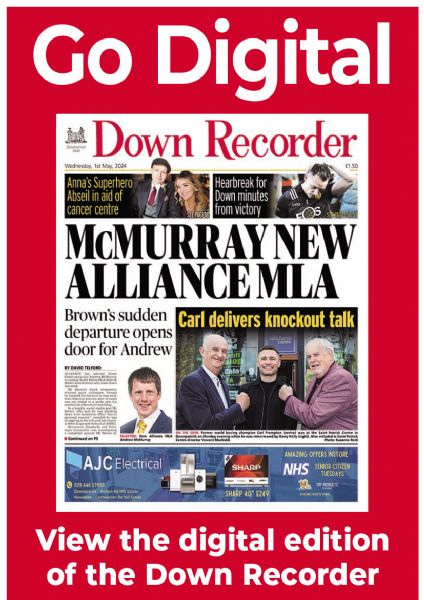Watershed moment for local campaign
Watershed moment for local campaign
2 November 2016
THE publication of two major reports into the future of health and social care have been described by a senior Downe Hospital campaigner as a “watershed.”
Down Community Health Committee chairman Eamonn McGrady said the publication of the Bengoa report, which outlines how services should be redesigned to make them fit for the 21st century, and health Minister Michelle O’Neill’s vision of health and social care across the Province over the next 10 years, are documents which provide both “challenges and opportunities.”
Addressing a special meeting of the health group in Downpatrick last week, Mr McGrady said while the Bengoa report does not make specific recommendations in respect of individual hospitals, it provides comments and observations and suggests what he described as “ground rules on future hospital provision.”
Viewed as a high level strategic document, the Bengoa report is the third major review of health services across the Province in the past 15 years and places a renewed focus on prevention and keeping people well, better primary care and a reform of hospital services.
In her report, Ms O’Neill said instead of thinking about buildings and hospitals as the only place to deliver services “we will deliver care and support in the most appropriate setting, ideally in people’s homes and communities. In most instances, people should only have to go to hospital when they need treatment that can’t be provided in their community.”
The Minister warned that the current health system is at “breaking point” and said her report, which concentrates on transforming the health service, reconfiguring services and instituting immediate change, does not represent a “quick fix.” She has also warned the current health and social care model is unsustainable.
Mr McGrady said the publication of the two reports provides campaigners with an opportunity to engage with others “to get something better for our community.”
He continued: “It is the people who own the NHS and who fund it and who are entitled to be heard and heard loudly. Many would agree that over the past number of years the voice of our community has not been heard loudly up in Stormont but times are different now and we look forward to a different type of engagement.”
Mr McGrady also suggested while you can’t reasonably expect for detailed plans to be laid before the Assembly about what is happening in the future of every hospital at this point in time, the new reports are a “watershed in terms of future health provision.”
He continued: “The minister’s document says it recognises that current models are having an increasingly negative impact on the quality and experience and care of service users so we at least have an acknowledgement that all is not well in the health service.
“Issues are impacting on people’s lives all the time and it is important to recognise that. The document talks about the importance of investing in staff and the needs of a rapidly changing population, particularly as people are going to live longer, often with long term health conditions. By 2026, the number of people over 65 is projected as being greater than the number of people under 16.”
Mr McGrady said while there is a big focus on health inequality in terms of deprivation, he would like to have seen much more emphasis on rural inequalities.
“Rural inequalities was a big issue when Ms O’Neill was the minister for agriculture and we would like to think that as all this develops, rural inequalities will come to the fore. It is totally legitimate for us to continue to campaign for local hospital services. Our community is entitled to demand local services; its entitled to prescribe what it would like those services to be and to enter into dialogue with those who are prepared to enter into dialogue with it to try to secure the best outcomes.”
Mr McGrady welcomed the Health Minister’s commitment to “work collaboratively in the spirt of openness and trust” to deliver outcomes moving forward, suggesting many in the local community do not feel officialdom was always open and transparent in its dealings with it in the past.
“Words are fine, but we need to see how the Minister proposes to take this vision forward, what role there is for people like ourselves in having our say and our input about what services our community needs locally and regionally.
Mr McGrady continued: “We want the 24-hour A&E service restored at the Downe. It is illogical to suggest we need the service up until 8pm when it closes until 8am the following morning. This just does not make sense. In addition, so many people can have their coronary care needs met in Downpatrick, but 18 months ago our dedicated coronary care unit was temporarily closed for financial reasons. We also need this service back.”
The health campaigner added: “There is a need for more investment in the health service and there does not seem to be an argument over that and a lot of that money needs to find its way to hospitals like the Downe. We have seen a lot of centralisation of services but this policy has been reversed in England and Wales were rural proofing was also introduced as key element in NHS change. Why not here, would the answers be too unpalatable?”

